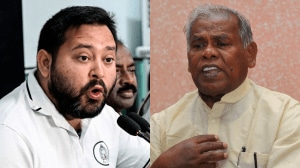P. Vaidyanathan Iyer is The Indian Express’s Managing Editor, and leads the newspaper’s reporting across the country. He writes on India’s political economy, and works closely with reporters exploring investigation in subjects where business and politics intersect. He was earlier the Resident Editor in Mumbai driving Maharashtra’s political and government coverage. He joined the newspaper in April 2008 as its National Business Editor in Delhi, reporting and leading the economy and policy coverage. He has won several accolades including the Ramnath Goenka Excellence in Journalism Award twice, the KC Kulish Award of Merit, and the Prem Bhatia Award for Political Reporting and Analysis. A member of the Pulitzer-winning International Consortium of Investigative Journalists (ICIJ), Vaidyanathan worked on several projects investigating offshore tax havens. He co-authored Panama Papers: The Untold India Story of the Trailblazing Offshore Investigation, published by Penguin. ... Read More
74% telecom FDI hits snag
The Budget proposal to hike the foreign direct investment (FDI) ceiling in the telecom sector to 74 per cent from 49 per cent now has hit a ...

The Budget proposal to hike the foreign direct investment (FDI) ceiling in the telecom sector to 74 per cent from 49 per cent now has hit a roadblock with the finance ministry and the department of telecom locking horns over the issue of management control.
According to senior government officials, the DoT has, upon the insistence of the home ministry, proposed that the minority Indian partner with just 26 per cent stake in a telecom venture should have 50 per cent representation in the company’s board.
Further, the CEO should be nominated by the Indian partner, the DoT and the home ministry have contended.
The finance ministry has, however, put its foot down and stated that the board composition should be commensurate with the holding pattern. ‘‘You cannot demand 50 per cent voting rights with just 26 per cent equity stake,’’ a finance ministry source said. Sources in the finance ministry said the department of economic affairs was close to finalising its response to the DoT proposal seeking vesting of management control on the Indian partner.
‘‘Technology today is owner neutral. Equipment by telecom companies is, in any case, a bought out item,’’ a source said.
The finance ministry’s contention is that though FDI is capped at 49 per cent now, telecom companies can resort to pyramiding of the equity structure and raise the FDI component to 74 per cent.
Recently, the DoT had sought the shareholding details of Hutchison Max Telecom Ltd to check if the FDI component had breached the existing cap of 49 per cent.
In proposing to raise the FDI cap to 74 per cent, Finance Minister P. Chidambaram had said some companies had an FDI component higher than the permissible 49 per cent by routing investment through subsidiaries and that he was only trying to make it transparent.
The move had, however, led to open criticism by the Left parties, which viewed it as compromising the country’s security interests.
The previous National Democratic Alliance (NDA) government too could not raise the FDI ceilings for several sectors including retail, insurance, civil aviation and telecom as recommended by the N.K. Singh committee on foreign investment.
An increase in the FDI cap, particularly in the telecom sector, was opposed by the Intelligence Bureau and the home ministry even in the NDA government.


- 01
- 02
- 03
- 04
- 05






























